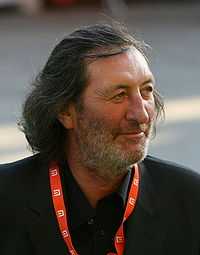Bolek Polívka
| Bolek Polívka | |
|---|---|
 Bolek Polívka at the Karlovy Vary International Film Festival | |
| Born |
31 July 1949 Vizovice, Czechoslovakia |
| Occupation | Actor, mime, playwright, screenwriter |
Boleslav Polívka (born 31 July 1949 in Vizovice) is a Czech film and theatre actor, mime, playwright and screenwriter. Polívka played in more than 40 films.[1]
Career
In 1971 Polívka graduated at the Janáček Academy of Music and Performing Arts in the play Podivné odpoledne dr. Zvonka Burkeho (Strange Afternoon of Dr. Zvonek Burke) by Ladislav Smoček.[2] In 1969 he co-founded Divadlo Husa na provázku (Goose on a String Theatre) and became one of its leading personalities. In 1993 he founded his own theater, Divadlo Bolka Polívky (Bolek Polívka Theatre) in Brno. He is one of the most important exponents of Czech mime and frequently appears with foreign theatre ensembles.[3]
Polívka's work as writer, director and mime performer is inspired by clowning, Commedia dell'arte, and early comedy films, but he occasionally introduces voice and words into his performances, which thus cross traditional theatrical boundaries into a form of "total acting". His unique theatrical style has been widely acclaimed in the Czech Republic and beyond.
He first appeared in films in the 1960s and has worked with the Czech director Vladimír Sís. Since the 1980s he has regularly worked with Věra Chytilová, who often casts him in the lead roles of her "moralistic comedies".[2]
In 1997 he was awarded the Czech Lion, and voted Best Actor at the Karlovy Vary International Film Festival, for his performance as the priest Holý in Zapomenuté světlo.[4] Polívka received his second Czech Lion for his role in the 2000 film Musíme si pomáhat by Jan Hřebejk. The film was also was nominated for the Academy Award for Best Foreign Language Film.
Bolek Polívka presents his own television shows - Manéž Bolka Polívky (Bolek Polívka's Arena) and Bolkoviny, both shown on Czech Television.[1] He often organizes public events and entertainments at his farm in Olšany near Brno.[5] In 2013, the Polívka's company went bust, and creditors of the now closed farm ask for 56 millions CZK at court.[6]
He has been married twice and has three children, one of whom, Anna Polívková is an actress.[2]
Controversy
According to BBC News, Polívka was involved in one of the oddest legal disputes of the Czech Republic's history.[7] In a 1993 TV performance he had himself crowned as "king" of an entirely fictional Kingdom of Wallachia - named after the genuine region Moravian Wallachia. However, in 1997 he began a collaboration with Tomáš Harabiš, who had independently created and officially registered another, equally fictional "Wallachian Kingdom", complete with "passports". Polívka, as a well known comic and popular actor, became the public face of the "Wallachian Kingdom" as the "Wallachian King, Boleslav I the Gracious, Forever". Harabiš and Polívka's partnership made the "Wallachian Kingdom" into one of the most successful tourist attractions in the Czech Republic.[7] Their working relationship continued amicably up to 2000, but an acrimonious dispute erupted over legal ownership of the "kingdom". The kingdom's name had been trademarked by Harabiš. In 2001 Harabiš deposed "King Boleslav" Polívka. In 2002 Polívka retaliated with a lawsuit. It accused Harabiš of making unlawful profits from Polívka as "King Boleslav".[7] In 2008 Polívka lost the case.[8]
Selected plays
- Am a Ea (Am and Ea)
- Pezza versus Čorba
- Pépe
- Trosečník (Castaway)
- Poslední leč
- Šašek a královna (The Jester and the Queen)
Selected filmography
- Balada pro Banditu (1978)
- Kalamita (Calamity) (1981)
- Poslední leč (1981)
- Šašek a královna (1987)
- Něžný Barbar (1989)
- Sedím na konári a je mi dobre (1989)
- Dědictví aneb Kurvahošigutntag (Fuck-off Guys, Goodbye) (1992)
- Zapomenuté světlo (Forgotten Light) (1996)
- Pelíšky (Cozy Dens) (1999)
- Musíme si pomáhat (Divided We Fall) (2000)
- Out of the City (2000)
- Pupendo
- Štěstí (Something Like Happiness) (2005)
- Roming (2007)
- Bathory (2008)
- Men in Hope (2011)
- The Magical Duvet (2011)
Notes
- ↑ 1.0 1.1 "Bolek Polívka". Czech Republic - The Official Website. Archived from the original on 2009-05-22. Retrieved 2013-12-10.
- ↑ 2.0 2.1 2.2 Fikejz (2007), pp. 458-460
- ↑ Fikejz (2007), pp. 458-460: for example, with the Italian ensemble "Piccolo teatro di Pontadero".)
- ↑ "Bathory - Actors - Bolek Polívka - Monk Petr". Czech Television. Retrieved 2009-04-26.
- ↑ "Farma - magické místo, kde se krávy mění v koně". www.bolek.cz. Retrieved 2009-04-26. (Czech)
- ↑ http://aktualne.centrum.cz/ekonomika/podnikani/clanek.phtml?id=776351
- ↑ 7.0 7.1 7.2 "Czech court to rule on fairy-tale kingdom". BBC NEWS. 2008-10-06. Retrieved 2009-04-26.
- ↑ "Soud sesadil Bolka Polívku z trůnu Valašského království". OstravskeNoviny.cz. Retrieved 2009-04-26. (Czech)
References
- Fikejz, Miloš (2007). Český film. Herci a herečky / II. díl (L-Ř). Prague: Libri. pp. 458–460. ISBN 978-80-7277-334-3. (Czech)
Further reading
- Petr Hájek: Předběžný portrét, Československý spisovatel, Praha, 1989 (Czech) - interviews and fragments of the theatre texts by Bolek Polívka
External links
| Wikimedia Commons has media related to Bolek Polívka. |
- Bolek Polívka at the Internet Movie Database
- Filmography at the Fandango.com
- Czech Republic - The official Website
- Bolek Polívka profile at the Czech Television Website
- Article in the New York Times (subscription needed)
- Polívka at the BBC News
| |||||
|